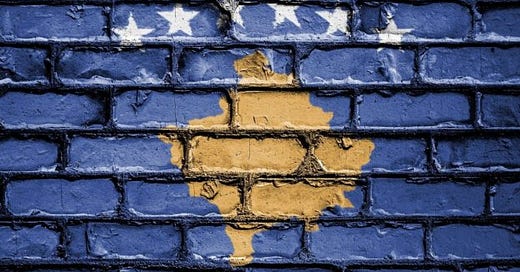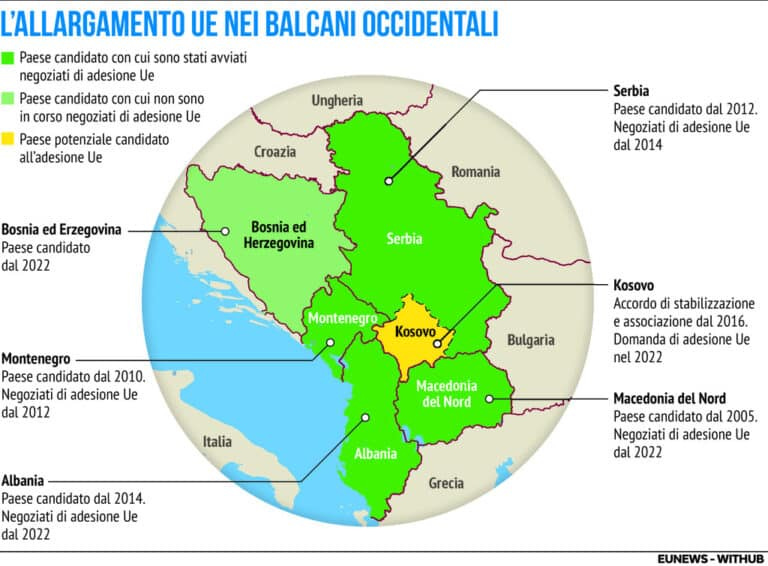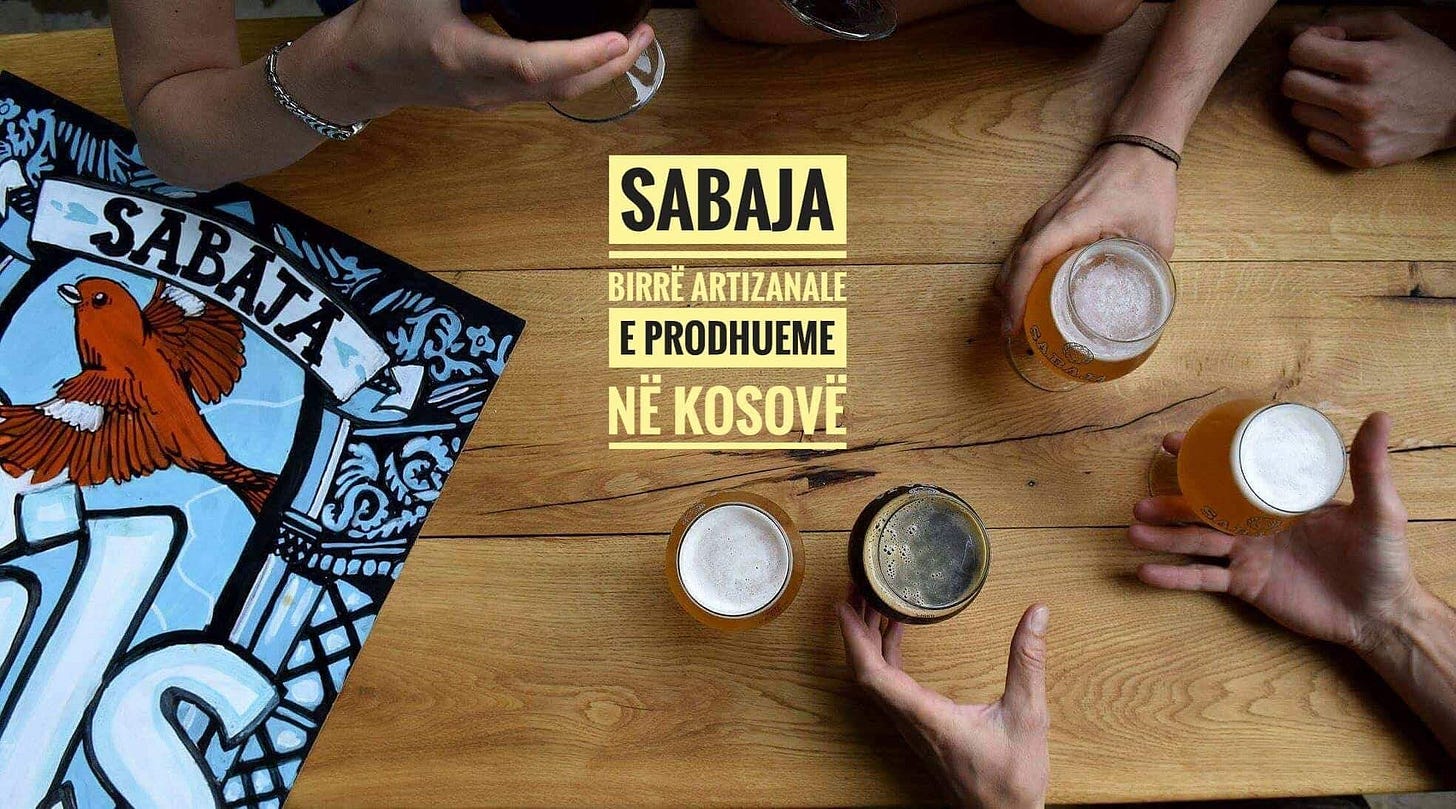S3E18. What if this is Kosovo's Golden Year?
While the Belgrade-Pristina dialogue is being unblocked, Kosovar citizens will soon be able to travel freely all over the continent. An interview with the European Parliament rapporteur, Thijs Reuten
Hi,
welcome back to BarBalkans, the newsletter (and website) with blurred boundaries.
Fifteen years have passed since the day of the youngest European State’s independence. Fifteen years of claiming independence every day, because not all the countries - in Europe and in the rest of the world - recognize its sovereignty.
Fifteen years of intense diplomatic work, between (a few) highs and (a lot of) lows, trying to convince the country that had to face this independence - Serbia - but not only: Cyprus, Greece, Romania, Slovakia and Spain, just in the European Union.
But this 2023 could really be the year of Kosovo, considering the way it started and the way it is developing. For a series of small (but not too small) steps that Prishtina is taking to reach its present and future stability.
Many of these efforts pass through the European Union. From visa liberalization to the facilitated dialogue for normalization of relations with Belgrade, and the recognition of the independence of Kosovo by all EU Member States.
This is why, thanks to a collaboration with Eunews, we will analyze all these aspects with a member of the European Parliament who is following Kosovo’s political issues very closely.
Together with Thijs Reuten, Dutch MEP of the Socialist & Democrats group, we try to find out if this is really Kosovo’s Golden Year.
Free to travel
After a five-year waiting period, Schengen visa liberalization will enter into force at the latest by 1st January 2024 for citizens of Kosovo. As it already happens for 63 other countries around the world.
We are talking about the exemption from applying for a visa to enter the Schengen Area, which is the area formed by the countries that have officially abolished all passport and all other types of border control at their mutual borders.
These third-country nationals can simply use their national passports - with no additional requirements - for short-term stays in EU and Schengen member States: up to 90 days within a total period of 180 days.
Why is the adoption of Kosovo visa liberalization so meaningful?
«The final adoption of Kosovo visa liberalization by the plenary session of the European Parliament means that we have completed the legislative process.
It is a historic breakthrough, considering that Kosovar citizens who do not have access to either an Albanian or Serbian passport are not able to travel easily in the rest of Europe.
And it also has a symbolic value. To me, this is the start of a new era, because finally Kosovo will join all the other visa-free countries».
Why will it enter into force on 1st January 2024 precisely?
«I would have wanted an earlier date, but this is linked to ETIAS entry into force, the European Travel Information and Authorization System, that has been postponed too many times. It was supposed to be already active, according to the original plan.
If a miracle happens and the system will be running before, theoretically, Kosovo visa liberalization could start earlier. But let's focus on 1st January 2024».
What will it change then for Kosovar citizens?
«That they can decide to travel freely to the European Union. They still have to show their passport, when they enter the EU or the Schengen Area, like many other people from all over the world. However, they will no longer have to think to get a visa.
Every time you have to pass through this process, you feel like doing an exam, although you are sure that you fulfill all the conditions. Us, the EU citizens, are used to travel easily wherever with our national passport, we need to get a visa for a very few countries. But for Kosovar citizens it was not like that».
Why did it take us so long?
«I think it took us so long because of political reasons in the Council. Some governments used this last pending European file in the series of visa liberalization in internal political debates. This is not good, because there are always elections coming up somewhere or political reasons to postpone a decision.
It is very simple. If we set rules and conditions - and a country meets all of them - we have to deliver. Unfortunately, the European Union has a tradition not always to deliver even when conditions are fulfilled. This is something that undermines the trust in the process, like in the case of Kosovo visa liberalization».
Albanian prime minister, Edi Rama, said that Kosovar citizens were more connected to Europe when they were part of Yugoslavia…
«Kosovo was left behind for so long, it was the last European country without visa liberalization. Even Bosnia and Herzegovina and Montenegro got it a long time ago.
Kosovar citizens were left aside, resulting in the situation that they were feeling less free or less included, compared to the times when they were part of former Yugoslavia. The more you think about it, the more ridiculous the situation gets.
In any case, Kosovo kept faith in the process, and now everything is behind us».

Between Pristina and Belgrade
Between February 27 and March 19, Serbia and Kosovo achieved a historic political breakthrough, thanks to the intense diplomatic efforts by the European Union.
In the midst of controversy and accusations, important understandings were reached in Brussels and in Ohrid (North Macedonia) for the Agreement on the path to normalization and the Implementation Annex to the Agreement.
Both texts are binding for both countries. Although they have not been signed, the EU will be able to use the financial leverage as a tool of persuasion: no implementation will mean no funds for the national economy.
And also the recognition of Kosovo as an independent State is on the way. If not explicitly, because of all the details that make it almost clear.
What do you think about the agreements between Serbia and Kosovo in the framework of the EU facilitated dialogue?
«I see a situation moving towards the recognition. Because the agreement includes the recognition of travel documents and symbols of Kosovo, the non-objection by Serbia to membership of Prishtina in international organizations, and also not encouraging others to block.
I am confident there will be some good news in the next months. An implementation committee will be set up, and there are very important talks ongoing, for example the one on the missing persons. In small steps, we are moving».
However, five EU Member States still do not recognize Kosovo as an independent State.
«Spain, Greece, Cyprus, Romania and Slovakia have had different paths in their position of non-recognition of Kosovo, but I hope that all of them will be engaged in this debate. I am really counting on them to assess the situation. It does not have to happen next week or next month, but there is a need for some kind of change.
I think it would be quite illogical, if these five countries will not show at least their willingness to move in the direction of recognizing Kosovo. In particular considering the direction the EU is taking on the normalization agreement, that we want to be binding and implemented».

There has been a big discussion about the fact that the agreement has not been signed.
«There is no discussion on the signing, the attention in Serbia and Kosovo has to be only on the implementation. Because we will put what has been agreed into the framework of the respective EU accession processes of Kosovo and Serbia.
If this agreement will not be implemented, there will have to be severe consequences. We must be strict and step up our game, because now we have a binding agreement. I think that the EU High Representative for Foreign Affairs, Josep Borrell, did a great job».
However, Serbia does not accept Kosovo independence. Does all of this have particular implications for Belgrade?
«Both countries must implement the agreement as fast as possible, of course. However, we saw Kosovo negotiating in a tough manner, but in good faith, while on the other side the President of Serbia, Aleksandar Vučić, wants to create a sort of insecurity in and around the process.
I am a friend of Serbia. I want this country to join the EU, but we need to be clear about the conditions: democracy, impartial political structures, Rule of Law. And the EU membership cannot be achieved, if Serbia is involved in all kinds of destabilizing actions from Montenegro to Bosnia and Herzegovina, and faces democratic backsliding.
If we can find the road to make its accession a success, as the biggest country and economy, Serbia could lead the entire region in joining the EU family».
Pit stop. Sittin’ at the BarBalkans
We have reached the end of this piece of road.
If this is going to be Kosovo’s Golden Year, we have to toast to peace and prosperity for Kosovar citizens and all their Balkan neighbors.
At our bar, the BarBalkans, today we celebrate the 15-year anniversary of Kosovo independence and the 10-years anniversary of the establishment of the first craft brewery in the country.
As an American/Kosovar partnership, Sabaja Brewery started brewing in June 2013. Its mission is to bring a greater variety of beer to the country. After 10 years, it is brewing eight different types of beer, in particular Ale styles like IPA, Porter, and Imperial Stout.
Its name contains the whole concept of this brewery. In ancient Illyria (the region corresponding to the Western part of the Balkan peninsula) beer was known as sabaja. But the word sabaja in Turkish - absorbed into the Albanian language - also means ‘morning’.
As Sabaja’s craft beers were a symbol of a new dawn, of a new beginning, for the beer industry in Kosovo, while keeping local traditions.
Let’s continue the BarBalkans journey. We will meet again in two weeks, for the 19th stop.
A big hug and have a good journey!
Your support is essential to realize all that you have read. And even more.
Because a job well done - always aiming to improve - needs many hours and energy, also to keep BarBalkans newsletter free for everyone.
An independent project like this cannot survive without the support of the readers. For this reason I kindly ask you to consider the possibility of donating:
Every second Wednesday of the month you will receive a monthly article-podcast on the Yugoslav Wars, to find out what was happening in the Balkans - right in that month - 30 years ago.
You can listen to the preview of BarBalkans - Podcast on Spreaker and Spotify.
Pay attention! The first time you will receive the newsletter, it may go to spam, or to “Promotions Tab”, if you use Gmail. Just move it to “Inbox” and, on the top of the e-mail, flag the specific option to receive the next ones there.







